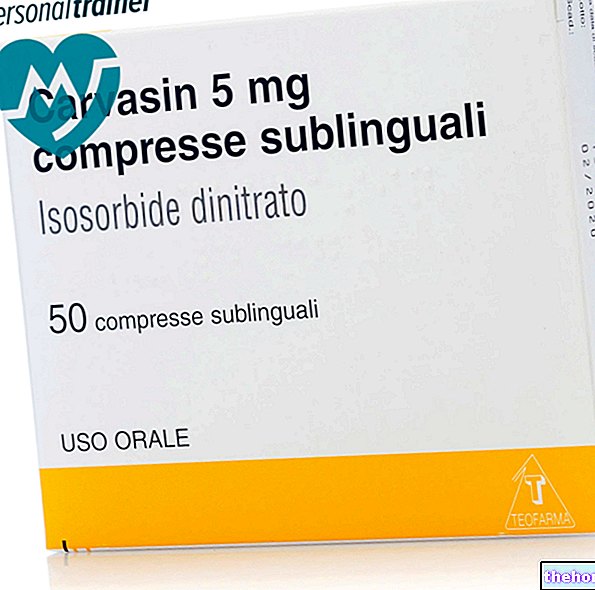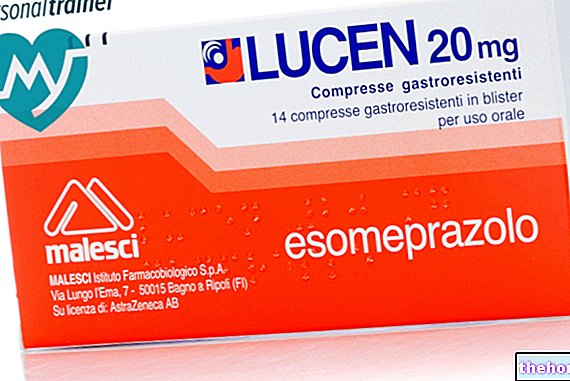Active ingredients: Methylergometrine (methylergometrine maleate)
METHERGIN 0.2 mg / ml solution for injection
METHERGIN 0.125 mg coated tablets
Indications Why is Methergin used? What is it for?
PHARMACOTHERAPEUTIC CATEGORY
Oxitocics - Ergot alkaloids.
THERAPEUTIC INDICATIONS
Active third stage (afterbirth) treatment - to promote placental abruption and reduce bleeding.
Treatment of uterine atony and haemorrhage during and after the afterbirth, in case of caesarean section or following abortion.
Treatment of uterine subinvolution, lochiometry, late puerperium bleeding
Contraindications When Methergin should not be used
Hypersensitivity to the active substance, to the other ergot alkaloids, or to any of the excipients.
Pregnancy (see "Pregnancy"); dilation phase of childbirth; second stage of delivery, prior to disengagement of the anterior shoulder (Methergin should not be used to induce and accelerate labor); severe hypertension; pre-eclampsia and eclampsia; vessel obliteration diseases (including cardiac ischemia); sepsis.
Precautions for use What you need to know before taking Methergin
General recommendations on administration
In breech presentation and other abnormal presentations, Methergin should not be administered before delivery of the fetus; in multiple deliveries, not before delivery of the last fetus.
Active treatment of the third stage of childbirth requires obstetric supervision. Intramuscular injection is the recommended route of administration. Intravenous injections should be done slowly over not less than 60 seconds, with careful monitoring of blood pressure. Intravenous or peri-arterial injections should be avoided.
Breastfeeding
Undesirable effects for the baby and reduced milk secretion are possible during breastfeeding. Women should not breastfeed during treatment with Methergin and at least 12 hours after the last dose. The milk secreted during this period must be discarded (see "Breastfeeding").
Hypertension and hepatic or renal insufficiency
To be used with caution in the presence of mild or moderate hypertension (severe hypertension is a contraindication) or in subjects with hepatic or renal insufficiency.
Coronary artery disease
Patients with coronary artery disease or with risk factors for coronary artery disease (e.g. smoking, obesity, diabetes, high cholesterol) may be more susceptible to the development of myocardial ischaemia and heart attack associated with methylergometrine-induced vasospasm (see "Side Effects") .
Therapeutic errors
Accidental administration to neonates has been reported. In these cases of accidental overdose in the newborn, symptoms such as respiratory failure, convulsions, cyanosis, oliguria and peripheral vasoconstriction have been reported. In addition, encephalopathy has been reported in infants presenting with signs and symptoms such as irritability, agitation and lethargy. Treatment must be symptomatic; in severe cases respiratory and cardiovascular support was required. In the absence of adequate treatment, fatal cases have been reported (see "Overdose").
The patient should be advised to store the medicine separately from other medicines intended for infants.
Interactions
Ergot alkaloids are substrates of cytochrome CYP3A4. Concomitant use of Methergin with potent CYP3A4 inhibitors, such as macrolide antibiotics (eg troleandomycin, erythromycin, clarithromycin), protease inhibitors or HIV reverse transcriptase ( eg ritonavir, indinavir, nelfinavir, delavirdine), or azolinic antifungals (eg ketoconazole, itraconazole, voriconazole), should be avoided, as this may cause "high exposure to methylergometrine and hence ergot toxicity (vasospasm and ischemia extremities and other tissues) (see "Interactions").
The concomitant use of Methergin with bromocriptine during the puerperium and with prostaglandins is not recommended (see "Interactions").
Caution is required in concomitant use of Methergin with less potent CYP3A4 inhibitors (eg cimetidine, delavirdine, grapefruit juice, quinupristin, dalfopristin) or with drugs with vasoconstrictor / vasopressor effects such as triptans (5HT1B / 1D receptor agonists ), sympathomimetics, or other ergot alkaloids or beta blockers (see "Interactions").
Interactions Which drugs or foods can modify the effect of Methergin
Tell your doctor or pharmacist if you have recently taken any other medicines, even those without a prescription.
The ergot alkaloids are substrates of the cytochrome CYP3A4.
Interactions resulting from concomitant use not recommended
CYP3A4 inhibitors
The concomitant use of Methergin with potent CYP3A4 inhibitors, such as macrolide antibiotics (eg troleandomycin, erythromycin, clarithromycin), HIV protease or reverse transcriptase inhibitors (eg ritonavir, indinavir, nelfinavir, delavirdine), or azoline antifungals (eg ketoconazole, itraconazole, voriconazole), should be avoided, as this may cause "increased exposure to methylergometrine and hence ergot toxicity (vasospasm and ischaemia of extremities and other tissues) (see" Precautions for use").
Bromocriptine
The concomitant use of bromocriptine and Methergin during the puerperium is not recommended as methylergometrine may increase the vasoconstrictive effect of the other ergot alkaloids (see "Precautions for use").
Prostaglanine
Prostaglandins (eg sulprostone, dinoprostone, misoprostol) facilitate the contraction of the myometrium, so Methergin can enhance the action of prostaglandins on the uterus and vice versa. Concomitant use with these medicinal products is not recommended (see "Precautions for use").
Interactions to consider
Less potent CYP3A4 inhibitors
Caution is required for concomitant use of Methergin with less potent CYP3A4 inhibitors (eg cimetidine, delavirdine, grapefruit juice, quinupristin, dalfopristin) as this may result in increased exposure to methylergometrine.
Vasoconstrictors, triptans, sympathomimetics and other ergot alkaloids
Caution is required when Methergin is used concomitantly with other vasoconstrictors or other ergot alkaloids. Methylergometrine may increase the vasoconstrictor / vasopressor effects of other drugs such as triptans (5HT1B / 1D receptor agonists), sympathomimetics (including those present in local anesthetics ) or other ergot alkaloids (see "precautions for use").
Beta blockers
Caution is required when Methergin is used simultaneously with beta blockers. Concomitant administration of beta-blockers may potentiate the vasoconstrictive action of ergot alkaloids (see "Precautions for use").
Anesthetics
Anesthetics such as halothane and methoxyflurane may reduce the oxytocic potency of Methergin (see "Dose, method and time of administration").
CYP3A4 inducers
Potent CYP3A4 inducing drugs (eg nevirapine, rifampicin) are likely to reduce the pharmacological action of Methergin.
Glyceryltrinitrate and other antianginal drugs
Methylergometrine induces vasoconstriction and may reduce the effect of glyceryltrinitrate and other antianginal drugs.
Warnings It is important to know that:
Fertility, pregnancy and breastfeeding
Pregnancy
Ask your doctor or pharmacist for advice before taking any medicine. The use of Methergin during pregnancy is contraindicated due to its potent uterotonic activity.
Feeding time
Methergin has been reported to reduce milk secretion and to be excreted in breast milk. There have been isolated reports of intoxication in breastfed infants whose mothers had taken the drug for several days. One or more of the following symptoms have been observed (and disappeared upon discontinuation of treatment): increased blood pressure, bradycardia or tachycardia, vomiting, diarrhea, agitation and convulsions.
In view of possible side effects for the baby and reduced milk production, the use of Methergin during breastfeeding is not recommended. Women should not breastfeed during treatment with Methergin and for at least 12 hours after the last dose. Milk secreted during this period should be discarded (see "Precautions for use").
Fertility
No fertility data is available even in light of current product indications.
Effects on ability to drive and use machines
Methylergometrine can cause dizziness and convulsions. Therefore, special attention is required when driving vehicles or using machines.
Important information about some of the ingredients
Methergin 0.125 mg coated tablets contain lactose and sucrose. If you have been told by your doctor that you have an intolerance to some sugars, contact your doctor before taking this medicinal product.
Dosage and method of use How to use Methergin: Dosage
Dosage
General population
Active treatment of afterbirth: Intramuscular (IM) injection is the recommended route of administration. When administered intravenously (IV), the dose should be injected slowly over a period of not less than 60 seconds (see "Precautions for use").
The recommended dosage of Methergin is: 1 ml (0.2 mg) i.m. or 0.5 to 1 ml (0.1 to 0.2 mg) injected slowly intravenously (see "Precautions for use") after disengagement of the anterior shoulder or, at the latest, immediately after the release of the fetus. Expulsion of the placenta, which usually breaks off at the first violent contraction induced by Methergin, should be facilitated manually by applying pressure to the bottom of the uterus.
In case of delivery under general anesthesia the recommended dose is 1 ml (0.2 mg) with a slow intravenous injection.
Treatment of uterine atony / haemorrhage: Intramuscular (IM) injection is the recommended route of administration. When administered intravenously (IV), the dose should be injected slowly over a period of not less than 60 seconds (see "Precautions for use").
The recommended dosage of Methergin is: 1 ml (0.2 mg) i.m. or 0.5 to 1 ml (0.1 to 0.2 mg) injected slowly intravenously (see "Precautions for use"). If necessary, administration can be repeated every 2-4 hours until a maximum of 5 doses within 24 hours.
Treatment of uterine subinvolution, lochiometry, late puerperium bleeding: The recommended dosage of Methergin is: 1 or 2 tablets (0.125 to 0.25 mg) orally or 0.5 to 1 ml (0.1 to 0.2 mg) im, up to 3 times a day and usually up to 5 days.
Special populations
Renal failure / hepatic failure
In the presence of impaired hepatic or renal function (see "Precautions for use"), caution should be exercised.
Overdose What to do if you have taken too much Methergin
Symptoms: nausea, vomiting, hypertension or hypotension, numbness, tingling and pain in extremities, respiratory depression, convulsions and coma.
Treatment: elimination of the drug ingested orally by administering high doses of activated charcoal.
Symptomatic treatment involves careful monitoring of the respiratory and cardiovascular systems. If it is necessary to sedate the patient, use benzodiazepines. In case of severe arterospasm, a vasodilator (e.g. sodium nitroprusside, phentolamine or dihydralazine) should be administered. In case of coronary constriction, a suitable treatment with antianginal (eg nitrates) must be carried out.
Therapeutic errors
Accidental administration to neonates has been reported. In these cases of accidental overdose in the newborn, symptoms such as respiratory failure, convulsions, cyanosis and oliguria and peripheral vasoconstriction have been reported. In addition, encephalopathy has been reported in infants presenting with signs and symptoms such as irritability, agitation and lethargy. Treatment must be symptomatic; in severe cases respiratory and cardiovascular support were required. In the absence of adequate treatment, fatal cases have been reported (see "Precautions for use").
In case of accidental ingestion / intake of an overdose of Methergin, notify your doctor immediately or go to the nearest hospital.
If you have any questions about the use of Methergin, ask your doctor or pharmacist.
Side Effects What are the side effects of Methergin
Like all medicines Methergin can cause side effects, although not everybody gets them.
Adverse reactions are listed in MedDRA system organ classes. Within each system-organ class, adverse reactions are ranked according to frequency, most frequent reactions first. Within each frequency group, adverse reactions are presented in order of decreasing severity. In addition, the corresponding frequency category is also provided for each adverse reaction using the convention (CIOMS III): Very common (≥ 1/10); common (≥ 1/100,
Disorders of the immune system
Very Rare: Anaphylactic reactions
Nervous system disorders
Common: Headache
Uncommon: Vertigo, convulsions
Very rare: Hallucinations
Ear and labyrinth disorders
Very rare: Tinnitus
Cardiac pathologies
Uncommon: Chest pain
Rare: Bradycardia, tachycardia, palpitations
Very rare: Myocardial infarction, coronary artery spasm
Vascular pathologies
Common: Hypertension
Uncommon: Hypotension
Rare: Vasoconstriction, vasospasm, arterial spasm (peripheral)
Very rare: Thrombophlebitis
Respiratory, thoracic and mediastinal disorders
Very rare: Nasal congestion
Gastrointestinal disorders
Uncommon: Vomiting, nausea
Very rare: Diarrhea
Skin and subcutaneous tissue disorders
Common: Skin rashes
Uncommon: Hyperhidrosis
Musculoskeletal and connective tissue disorders
Very rare: Muscle spasms
Pregnancy, puerperium and perinatal conditions
Common: Abdominal pain (caused by uterine contractions)
Adverse reactions from post-marketing spontaneous reports and literature cases (frequency not known)
Since these reactions are reported voluntarily by a population of uncertain size, it is not possible to reliably estimate their frequency which is therefore categorized as unknown. Adverse reactions are listed in MedDRA system organ classes. Within each class, adverse reactions are arranged in descending order of severity.
Nervous system disorders Cerebrovascular accidents, paraesthesia.
Cardiac disorders Ventricular fibrillation, ventricular tachycardia, angina pectoris, atrioventricular block.
Compliance with the instructions contained in the package leaflet reduces the risk of undesirable effects.
Reporting of side effects
If you get any side effects, including any possible side effects not listed in this leaflet, contact your doctor or pharmacist. Undesirable effects can also be reported directly through the national reporting system at "https://www.aifa.gov.it/content/segnalazioni-reazioni-avverse". By reporting side effects you can help provide more information on the safety of this medicine.
Expiry and Retention
EXPIRY: See the expiry date indicated on the package.
WARNING: Do not use the medicine after the expiry date indicated on the package.
The expiry date refers to the product in intact packaging, correctly stored.
Methergin 0.2 mg / ml solution for injection:
Store between 2 ° C and 8 ° C.
Do not freeze.
Keep the vials in the outer packaging to protect them from light. The vials can be stored for 2 weeks out of the refrigerator, but at temperatures not exceeding 25 ° C.
Methergin 0.125 mg coated tablets:
This medicine does not require any special storage conditions
Medicines should not be disposed of via wastewater or household waste. Ask your pharmacist how to dispose of medicines you no longer use. This will help protect the environment. Keep this medicine out of the sight and reach of children.
COMPOSITION
METHERGIN 0.2 mg / ml solution for injection
1 ml of solution for injection contains:
Active principle:
methylergometrine maleate acid 0.200 mg
Excipients:
maleic acid, sodium chloride, water for injections.
METHERGIN 0.125 mg coated tablets
One coated tablet contains:
Active principle:
methylergometrine maleate acid 0.125 mg
Excipients:
maleic acid, gelatin, stearic acid, talc, corn starch, lactose monohydrate, red iron oxide, anhydrous colloidal silica, gum arabic, sucrose.
PHARMACEUTICAL FORMS AND CONTENT
METHERGIN 0.2 mg / ml solution for injection: 6 ampoules of 1 ml of solution for injection (i.m., i.v.).
METHERGIN 0.125 mg coated tablets: 15 coated tablets
Instructions for opening the vials:
To open the vials correctly, follow the instructions below:
The opening line is below the colored dot.
Position the vial as shown in the figure.
To open the vials, place your thumb on the colored dot and push backwards.
Source Package Leaflet: AIFA (Italian Medicines Agency). Content published in January 2016. The information present may not be up-to-date.
To have access to the most up-to-date version, it is advisable to access the AIFA (Italian Medicines Agency) website. Disclaimer and useful information.
01.0 NAME OF THE MEDICINAL PRODUCT
METHERGIN
02.0 QUALITATIVE AND QUANTITATIVE COMPOSITION
METHERGIN 0.2 mg / ml solution for injection
1 ml of solution for injection contains:
Active principle
methylergometrine maleate acid ............................................... ..................... 0.20 mg
METHERGIN 0.125 mg coated tablets
One coated tablet contains:
Active principle
methylergometrine maleate acid ............................................... ..................... 0.125 mg
Excipients with known effects
lactose monohydrate, sucrose
For the full list of excipients see section 6.1
03.0 PHARMACEUTICAL FORM
Injectable solution.
Coated tablets.
04.0 CLINICAL INFORMATION
04.1 Therapeutic indications
Active third stage (afterbirth) treatment - to promote placental abruption and reduce bleeding.
Treatment of uterine atony and haemorrhage during and after the afterbirth, in case of caesarean section or following abortion.
Treatment of uterine subinvolution, lochiometry, late puerperium bleeding.
04.2 Posology and method of administration
Dosage
General population
Active treatment of afterbirth :
Intramuscular (IM) injection is the recommended route of administration. When administered intravenously (i.v.), the dose should be injected slowly over a period of not less than 60 seconds (see section 4.4).
The recommended dosage of Methergin is: 1 ml (0.2 mg) i.m. or 0.5 to 1 ml (0.1 to 0.2 mg) injected slowly intravenously after disengagement of the anterior shoulder or, at the latest, immediately after delivery of the fetus. Expulsion of the placenta , which usually comes off at the first violent contraction induced by Methergin, should be facilitated manually by pressure exerted on the bottom of the uterus.
In case of delivery under general anesthesia the recommended dose is 1 ml (0.2 mg) with a slow intravenous injection.
Treatment of uterine atony / hemorrhage
Intramuscular (IM) injection is the recommended route of administration. When administered intravenously (i.v.), the dose should be injected slowly over a period of not less than 60 seconds (see section 4.4).
The recommended dosage of Methergin is: 1 ml (0.2 mg) i.m. or 0.5 to 1 ml (0.1 to 0.2 mg) injected slowly intravenously (see section 4.4). If necessary, the administration can be repeated every 2-4 hours up to a maximum of 5 doses within 24 hours.
Treatment of uterine subinvolution, lochiometry, late puerperium bleeding
The recommended dosage of Methergin is: orally, 1 or 2 tablets (0.125 to 0.25 mg) or 0.5 to 1 ml (0.1 to 0.2 mg) i.m. up to 3 times a day and usually up to 5 days.
Special populations
Renal failure / hepatic failure
In the presence of impaired hepatic or renal function (see section 4.4), caution should be exercised.
04.3 Contraindications
Hypersensitivity to the active substance, to other ergot alkaloids, or to any of the excipients listed in section 6.1.
Pregnancy (see section 4.6).
Dilatation phase of childbirth; second stage of delivery, prior to disengagement of the anterior shoulder (Methergin should not be used to induce and accelerate labor).
Severe hypertension.
Pre-eclampsia and eclampsia.
Vessel obliteration disease (including cardiac ischemia).
Sepsis.
04.4 Special warnings and appropriate precautions for use
General recommendations on administration
In breech presentation and other abnormal presentations, Methergin should not be administered before complete delivery of the fetus and in multiple deliveries not before delivery of the last fetus.
Active treatment of the third stage of childbirth requires obstetric supervision.
Intramuscular injection is the recommended route of administration.
Intravenous injections should be done slowly over not less than 60 seconds, with careful monitoring of blood pressure.
Intra- or peri-arterial injections should be avoided.
Breastfeeding
Undesirable effects for the baby and reduced milk secretion are possible during breastfeeding. Women should not breastfeed during treatment with Methergin and at least 12 hours after the last dose.
Milk secreted during this period must be eliminated (see section 4.6).
Hypertension and hepatic or renal insufficiency
To be used with caution in the presence of mild or moderate hypertension (severe hypertension is a contraindication) or in subjects with hepatic or renal insufficiency.
Coronary artery disease
Patients with coronary artery disease or with risk factors for coronary artery disease (e.g. smoking, obesity, diabetes, hypercholesterolemia) may be more susceptible to the development of myocardial ischaemia and infarction associated with methylergometrine-induced vasospasm (see section 4.8).
Therapeutic errors
Accidental administration to neonates has been reported. Symptoms such as respiratory failure, convulsions, cyanosis, oliguria and peripheral vasoconstriction have been reported in these cases of accidental overdose in the newborn. In addition, encephalopathy has been reported in infants presenting with signs and symptoms such as irritability, agitation and lethargy. Treatment must be symptomatic; in severe cases respiratory and cardiovascular support was required. Fatal cases have been reported in the absence of adequate treatment (see section 4.9).
The patient should be advised to store the medicine separately from other medicines intended for infants.
Interactions
Ergot alkaloids are substrates of cytochrome CYP3A4. Concomitant use of Methergin with potent CYP3A4 inhibitors, such as macrolide antibiotics (eg troleandomycin, erythromycin, clarithromycin), protease inhibitors or HIV reverse transcriptase ( eg ritonavir, indinavir, nelfinavir, delavirdine), or azolinic antifungals (eg ketoconazole, itraconazole, voriconazole), should be avoided, as this may cause "high exposure to methylergometrine and hence ergot toxicity (vasospasm and ischemia extremities and other tissues) (see section 4.5).
The concomitant use of Methergin with bromocriptine during the puerperium and with prostaglandins is not recommended (see section 4.5).
Caution is required in concomitant use of Methergin with less potent CYP3A4 inhibitors (eg cimetidine, delavirdine, grapefruit juice, quinupristin, dalfopristin) or with drugs with vasoconstrictor / vasopressor effects such as triptans (5HT1B / 1D receptor agonists). ), sympathomimetics, or other ergot alkaloids or beta-blockers (see section 4.5).
Important information about some of the ingredients
Methergin 0.125 mg coated tablets contain lactose. Patients with rare hereditary problems of galactose intolerance, the Lapp lactase deficiency, or glucose / galactose malabsorption should not take this medicine.
Methergin 0.125 mg coated tablets contain sucrose. Patients with rare hereditary problems of fructose intolerance, glucose-galactose malabsorption, or sucrase-isomaltase insufficiency should not take this medicine.
04.5 Interactions with other medicinal products and other forms of interaction
The ergot alkaloids are substrates of the cytochrome CYP3A4.
Interactions resulting from concomitant use not recommended
CYP3A4 inhibitors
The concomitant use of Methergin with potent CYP3A4 inhibitors, such as macrolide antibiotics (eg troleandomycin, erythromycin, clarithromycin), HIV protease or reverse transcriptase inhibitors (eg ritonavir, indinavir, nelfinavir, delavirdine), or azoline antifungals (eg ketoconazole, itraconazole, voriconazole), should be avoided, as it may cause increased exposure to methylergometrine and hence ergot toxicity (vasospasm and ischaemia of extremities and other tissues) (see section 4.4).
Bromocriptine
The concomitant use of bromocriptine and Methergin during the puerperium is not recommended as methylergometrine may enhance the vasoconstrictive effect of the other ergot alkaloids (see section 4.4).
Prostaglandins
Prostaglandins (eg sulprostone, dinoprostone, misoprostol) facilitate the contraction of the myometrium, so Methergin can enhance the action of prostaglandins on the uterus and vice versa. Concomitant use with these medicinal products is not recommended (see section 4.4).
Interactions to consider
Less potent CYP3A4 inhibitors
Caution is required in concomitant use of Methergin with less potent CYP3A4 inhibitors (eg cimetidine, delavirdine, grapefruit juice, quinupristin, dalfopristin), as it may produce increased exposure to methylergometrine.
Vasoconstrictors, triptans, sympathomimetics and other ergot alkaloids
Caution is required when Methergin is used concomitantly with other vasoconstrictors or other ergot alkaloids. Methylergometrine may increase the vasoconstrictor / vasopressor effects of other drugs such as triptans (5HT1B / 1D receptor agonists), sympathomimetics (including those present in local anesthetics ) or other ergot alkaloids (see section 4.4).
Beta blockers
Caution is required when Methergin is used simultaneously with beta blockers. Concomitant administration of beta-blockers may potentiate the vasoconstrictive action of ergot alkaloids (see section 4.4).
Anesthetics
Anesthetics such as halothane and methoxyflurane may reduce the oxytocic potency of Methergin (see section 4.2).
CYP3A4 inducers
Potent CYP3A4 inducing drugs (eg nevirapine, rifampicin) are likely to reduce the pharmacological action of Methergin.
Glyceryltrinitrate and other antianginal drugs
Methylergometrine induces vasoconstriction and may reduce the effect of glyceryltrinitrate and other antianginal drugs.
04.6 Pregnancy and lactation
Pregnancy
The use of Methergin during pregnancy is contraindicated due to its potent uterotonic activity (see section 4.3).
Pregnancy
Methylergometrine has been reported to reduce milk secretion and to be excreted in breast milk (see sections 5.1-5.2). There have been isolated reports of intoxication in breastfed infants whose mothers had taken the drug for several days. One or more of the following symptoms have been observed (and disappeared upon discontinuation of treatment): increased blood pressure, bradycardia or tachycardia, vomiting, diarrhea, agitation and convulsions.
In view of possible side effects for the baby and reduced milk production, the use of Methergin during breastfeeding is not recommended.
Women should not breastfeed during treatment with Methergin and for at least 12 hours after the last dose. Milk secreted during this period should be discarded (see section 4.4).
Fertility
No fertility data is available even in light of current product indications.
04.7 Effects on ability to drive and use machines
Methylergometrine can cause dizziness and convulsions. Therefore, special attention is required when driving vehicles or using machines.
04.8 Undesirable effects
Adverse reactions (table 1) are listed in MedDRA system organ classes. Within each system-organ class, adverse reactions are ranked by frequency, most frequent reactions first. Within each frequency group, adverse reactions are ranked in order of decreasing severity. In addition, the corresponding frequency category is also provided for each reaction using the following convention (CIOMS III): Very common (≥ 1/10); common (≥ 1/100,
Table 1
Adverse reactions from post-marketing spontaneous reports and literature cases (frequency not known)
Since these reactions are reported voluntarily by a population of uncertain size, it is not possible to reliably estimate their frequency which is therefore categorized as unknown. Adverse reactions are listed in MedDRA system organ classes. Within each class, adverse reactions are arranged in descending order of severity.
Nervous system disorders
Cerebrovascular accidents, paraesthesia.
Cardiac pathologies
Ventricular fibrillation, ventricular tachycardia, angina pectoris, atrioventricular block.
Reporting of suspected adverse reactions
Reporting of suspected adverse reactions occurring after authorization of the medicinal product is important as it allows continuous monitoring of the benefit / risk balance of the medicinal product. Healthcare professionals are asked to report any suspected adverse reactions via the national reporting system. "address http://www.agenziafarmaco.gov.it/it/responsabili.
04.9 Overdose
Symptoms
Nausea, vomiting, hypertension or hypotension, numbness, tingling and pain in extremities, respiratory depression, convulsions, coma.
Treatment
Elimination of the drug ingested orally by administering high doses of activated charcoal.
Symptomatic treatment involves careful monitoring of the cardiovascular and respiratory systems.
If it is necessary to sedate the patient, benzodiazepines can be used. In case of severe arterial spasm, a vasodilator such as sodium nitroprusside, phentolamine or dihydralazine should be administered. In case of coronary constriction, a suitable treatment with antianginal (eg nitrates) must be carried out.
Therapeutic errors
Accidental administration to neonates has been reported. In these cases of accidental overdose in the newborn, symptoms such as respiratory failure, convulsions, cyanosis, oliguria and peripheral vasoconstriction have been reported. In addition, encephalopathy has been reported in infants presenting with signs and symptoms such as irritability, agitation and lethargy. Treatment must be symptomatic; in severe cases respiratory and cardiovascular support were required. In the absence of adequate treatment, fatal cases have been reported (see section 4.4).
05.0 PHARMACOLOGICAL PROPERTIES
05.1 Pharmacodynamic properties
Pharmacotherapeutic group: Oxitocics - Ergot alkaloids.
ATC code: G02AB01.
Mechanism of action
Methylergometrine, a semisynthetic derivative of the natural alkaloid ergometrine, is a powerful and specific uterotonic agent. It acts directly on the smooth muscle of the uterus by increasing the basal tone, frequency and amplitude of rhythmic contractions. Its effects on the central nervous system and on the cardiovascular systems are less pronounced than other ergot alkaloids.
Pharmacodynamic effects
The potent and selective oxytocic effect of methylergometrine derives from its specific mechanism of action as a partial agonist and antagonist of serotonergic, dopaminergic and α-adrenergic receptors. However, this does not completely preclude the possibility of complications due to vasoconstriction (see section 4.8).
For the prevention and treatment of uterine haemorrhage by IM injection, the combination of Methergin and oxytocin can be considered, since oxytocin has a very short latency period, while methylergometrine has a prolonged duration of action.
05.2 Pharmacokinetic properties
The action of Methergin occurs within 30-60 seconds after intravenous administration, after 2-5 minutes after intramuscular administration and after 5-10 minutes after oral administration, and its duration is 4-6 hours.
Absorption : Studies conducted on fasting healthy volunteer women have shown that oral absorption of a 0.2 mg tablet is quite rapid, with a mean peak plasma concentration (Cmax) of 3243 + 1308 pg / ml observed at 1.12 +0.82 hours (Tmax). After an intramuscular injection of 0.2 mg, the Cmax is 5918 + 1952 pg / ml and the Tmax is 0.41 + 0.21 hours.
Absorption after intramuscular injection is 25% greater than for oral administration. Delayed gastrointestinal absorption (Tmax of approximately 3 hours) has been observed in postpartum patients receiving continuous therapy with Methergin tablets.
Distribution : Following intravenous administration, methylergometrine is rapidly distributed from plasma to peripheral tissues within 2-3 minutes or less. In healthy female volunteers, the volume of distribution is 56.1 ± 17.0 liters. It is not known whether the drug crosses the blood brain barrier.
Biotransformation : methylergometrine is mainly metabolised in the liver. The metabolic pathway has not been studied in humans. Studies in vitro showed Ndemethylation and hydroxylation of the phenyl ring.
Elimination : in healthy female volunteers the plasma clearance, following oral administration, is 14.4 + 4.5 liters / hour and the mean elimination half-life is 3.29 + 1.31 hours. A study in male volunteers has shown that only 3% of the oral dose is excreted as unchanged drug in the urine. The product is eliminated primarily with the bile in the faeces. Methylergometrine is also excreted in breast milk. 1 hour after administration of a single dose of 250 micrograms of methylergometrine, the milk / plasma concentration ratio was 0.18 + 0.03. The half-life of methylergometrine in milk reported is 2.3 + 0.3 h.
Linearity / non-linearity: the bioavailability of the tablet was proportional to the dose.
Bioavailability / bioequivalence studies: the bioavailability of the tablet was equivalent to that of the i.m. solution. administered orally.
05.3 Preclinical safety data
The genotoxic potential of methylergometrine has not been determined. There are no studies available that have evaluated the carcinogenic potential of methylergometrine. Standard fertility and reproductive toxicity studies with methylergometrine in animals have not been performed.
06.0 PHARMACEUTICAL INFORMATION
06.1 Excipients
METHERGIN 0.2 mg / ml solution for injection
Maleic acid, sodium chloride, water for injections.
METHERGIN 0.125 mg coated tablets
Maleic acid, gelatin, stearic acid, talc, corn starch, lactose monohydrate, red iron oxide, anhydrous colloidal silica, gum arabic, sucrose.
06.2 Incompatibility
Not relevant.
06.3 Period of validity
Methergin 0.2 mg / ml solution for injection: 4 years
Methergin 0.125 mg coated tablets: 4 years
06.4 Special precautions for storage
METHERGIN 0.2 mg / ml solution for injection
Store between 2 ° C and 8 ° C.
Do not freeze.
Keep the vials in the outer packaging to protect them from light.
The vials can be stored for 2 weeks out of the refrigerator, but at temperatures not exceeding 25 ° C.
METHERGIN 0.125 mg coated tablets
This medicine does not require any special storage conditions.
06.5 Nature of the immediate packaging and contents of the package
METHERGIN 0.2 mg / ml solution for injection
Glass ampoule - 6 ampoules of 1ml
METHERGIN 0.125 mg coated tablets
Blisters - 15 coated tablets
06.6 Instructions for use and handling
No special instructions.
07.0 MARKETING AUTHORIZATION HOLDER
Novartis Farma S.p.A.
Largo Umberto Boccioni, 1 - 21040 Origgio (VA)
08.0 MARKETING AUTHORIZATION NUMBER
METHERGIN 0.2 mg / ml solution for injection A.I.C. n. 004225025
METHERGIN 0.125 mg coated tablets A.I.C. n. 004225037
09.0 DATE OF FIRST AUTHORIZATION OR RENEWAL OF THE AUTHORIZATION
METHERGIN 0.2 mg / ml solution for injection
Date of first authorization: 29 November 1950
Date of most recent renewal: 01 June 2010
METHERGIN 0.125 mg coated tablets
Date of first authorization: 29 July 1959
Date of most recent renewal: 01 June 2010
10.0 DATE OF REVISION OF THE TEXT
September 2015



























